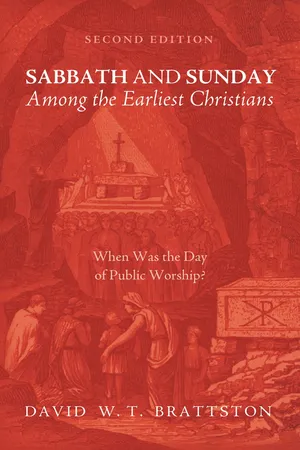![]()
1
The Question
There are strongly-held differences as to whether God wishes Saturday or Sunday to be the main weekly day of Christian assembling and worship. As with many religious issues, both sides appeal to the Bible; then, when arguments based on it fail to convince, they look to the practice of the earliest Christians. For instance, some adherents of a seventh-day Saturday Sabbath allege as fact that Sunday did not become the chief day of the Christian week until the time of the Roman emperor Constantine in the early fourth century AD, when he changed it from Saturday to win over non-Christian sun worshippers.
Consulting early Christian practices and customs is a good idea because they record how Christians lived their faith when the unwritten teachings and Bible interpretations of Christ and the apostles were still fresh in Christian memory, and reveal the consensus of Christian conviction on various matters before they became issues in dispute. These sources also witnessed ways of doing things passed down through overlapping generations.
The present book therefore distils the five hundred (more or less) Christian writings that have come down to us since before the mass apostasy of AD 249–251, in order to determine which day(s) the first heirs of the gospel observed and what kinds of activities God endorsed for the main day(s) of the Christian week.
As in the religious world today, there were differences of outlook even in Christian antiquity as to which day(s) was to be observed, how they were to be observed, whether the Old Testament rules for the Sabbath were still binding, whether Sunday replaced the Saturday Sabbath, and which genres of activities Christians should pursue and which not on the chief day(s) of the week. The present book explores all these issues and will note where there was agreement and where different early Christians practiced different behaviors.
![]()
2
Unity in Essentials
The earliest Christian literature, well before Constantine, is unanimous that the main day of the week for early Christians to gather and worship was not the seventh-day Sabbath, but Sunday, which they sometimes called “the first day” or “the eighth day” or “the Lord’s Day.” We have inklings of this already in apostolic times: (1) in Acts 20.7 Christians at Troas celebrated Holy Communion and listened to a sermon “upon the first day of the week,” and (2) in 1 Corinthians 16.2 believers were exhorted: “Upon the first day of the week let every one of you lay by him in store, as God hath prospered him, that there be no gatherings when I come.” In opposition to Sabbath-keeping and other Jewish practices, the Letter of Barnabas 15. 8–9 speaking from a Christian viewpoint sometime between AD 70 and 132, records that:
Abundant evidence of Sunday as the day of Christian communal worship comes from the middle of the second century. The most replete is in a description of a typical Christian weekly worship service in Justin’s First Apology 67:
Justin was a Christian teacher at Rome who was martyred for the Faith around AD 165.
Present-day Sabbatarians deny that “the Lord’s day” in Revelation 1.10 indicates Sunday observance, and allege that it was the common term only for the time preceding the Second Coming. However, in The Epistle of the Apostles 17, Jesus himself is depicted as calling the eighth day “the Lord’s day.” Originating in Asia Minor or Egypt in the middle of the second century, this Epistle purports to be the revelation of Christ to the apostles. Although we may doubt that it is inspired or scripture or even apostolic, it does witness to an early date for Christians observing Sunday and describing it as “the Lord’s Day.” From the eastern Mediterranean, sometime between AD 180 and 200, The Acts of Peter begins: “On the first day of the week, that is, on the Lord’s day, a multitude gathered together, and they brought unto Peter many sick that he might heal them.”
Tertullian had been a prominent lawyer in the City of Rome before converting and being ordained in Tunisia, where he became the founder of Latin Christian literature. He probably wrote On Idolatry in his earlier, “catholic” period, when he was a member of the mainline or “Great Church,” between AD 198 and the 220s. In Chapter 14, after noting of Christians that “by us, to whom Sabbaths are strange” and mentioning “the Lord’s day,” Tertullian wrote that it was already well-known by pagans that Christians “have a festive day every eighth day.” His earlier Ad Nationes 1.13 reminded his readers as a fact similarly well-known among pagans that Christians “make Sunday a day of festivity.”
Compiled in Syria, The Didascalia is a long comprehensive manual for church ...
